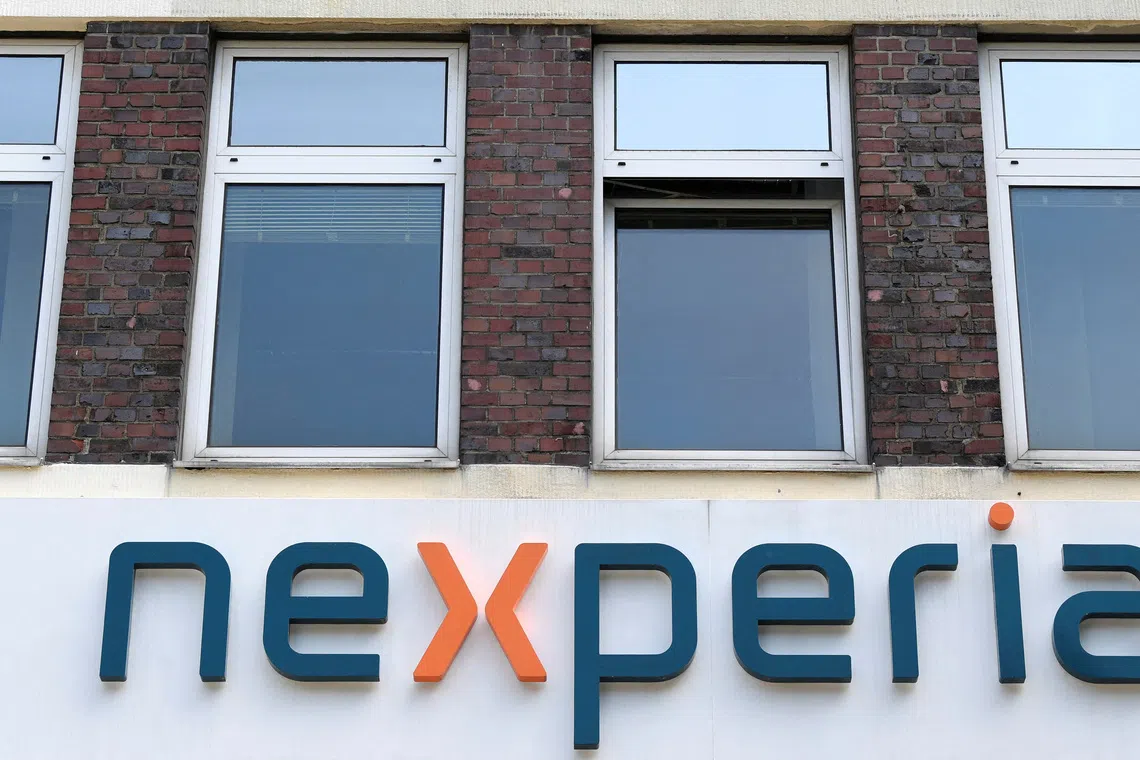Carmakers fear for production as spat over Chinese-owned chipmaker Nexperia escalates
Sign up now: Get ST's newsletters delivered to your inbox

China has blocked Nexperia from exporting products after the Dutch government seized control of the company.
PHOTO: REUTERS
Follow topic:
WASHINGTON – An obscure chip supplier is threatening to set off a chain reaction that could halt global auto production lines.
Carmakers and their suppliers received notice last week from chipmaker Nexperia that it could no longer guarantee delivery of its chips stemming from a dispute between China and the Dutch government.
The Alliance for Automotive Innovation, which represents General Motors, Toyota, Volkswagen, Hyundai and nearly all other major automakers, warned that the chip supply disruption could quickly hold up US auto production.
“If the shipment of automotive chips doesn’t resume – quickly – it’s going to disrupt auto production in the US and many other countries and have a spillover effect in other industries,” said the group’s chief executive John Bozzella.
Meanwhile, automakers in Europe are holding urgent meetings to fend off potential outages that could come within a month, according to people familiar with the matter.
“If the situation is not resolved quickly at the political level, there is a risk of a standstill in large parts of global automotive production and in numerous other industrial sectors,” said Mr Wolfgang Weber, who heads Germany’s electrical and digital industry association ZVEI.
Nexperia is the latest company caught in an escalating global trade spat ahead of China’s high-stakes talks with the US.
While Chinese leader Xi Jinping and US President Donald Trump are to meet
Beijing on Oct 4 blocked Nexperia from exporting products from its Chinese factories. The step was in response to the Dutch government seizing control of the company by invoking a Cold War-era law to ensure European access to essential products in an emergency.
Nexperia is owned by China’s Wingtech Technology, which was added to a US trade blacklist late in 2024.
The moves add to a simmering conflict over dominance of next-generation technologies.
Beijing has pushed back against European Union import tariffs targeting Chinese electric vehicles (EVs), and it recently moved to tighten control over its EV and battery exports. China’s home-grown industry has built up a lead in EV technology partly because of strong government support.
While Nexperia’s chips are not considered cutting-edge, they are widespread and make up a key part of the automotive supply chain, with hundreds of them in a single car. Its semiconductors help operate functions like switches or steering wheel control. The automotive sector accounts for over 60 per cent of Nexperia’s revenue, which came in at US$2.06 billion (S$2.7 billion) in 2024.
The export curbs are already prompting companies to look elsewhere. German chipmaker Infineon Technologies – one of the major suppliers to the auto industry – is fielding calls from Nexperia customers seeking alternative supplies, the people said.
Automakers do not necessarily source chips directly but often buy finished parts with semiconductors in them from larger suppliers like Bosch and Aumovio, the car parts business spun off by Continental.
Those companies also get individual components from smaller suppliers, making it difficult to quickly assess the scope of potential supply chain disruptions.
Nexperia has told its customers and business partners that the Chinese export controls constitute a force majeure event, which would release the company from legally binding contract terms, according to a letter seen by Bloomberg News.
The company is engaging with the Chinese authorities to obtain an exemption from the export curbs, it said on Oct 14.
Volkswagen, Europe’s biggest automaker, has set up a task force to look into how its biggest suppliers and their hundreds of components are potentially affected. While the group does not source Nexperia chips directly, some go into components used in its vehicles.
“Our production is currently unaffected,” the company said, adding that it is trying to “identify potential risks at an early stage and decide on the necessary measures”.
Germany’s Bosch, the world’s largest auto parts maker, said it is in contact with Nexperia, which is one of its electronics suppliers. Bosch is working to minimise any potential impact, the company added.
Nexperia operates an assembly site in Guangdong province, bordering Hong Kong. It also has plants in Germany and Britain, and two assembly centres in Malaysia and the Philippines, according to its website.
It employs more than 12,500 people and produces about 3,000 semiconductors every second.
The industry’s current stock of Nexperia chips is generally predicted to last only a few weeks, and production halts may follow if it is gone, according to the European Automobile Manufacturers’ Association (Acea), the industry’s main trade group in the region.
“We suddenly find ourselves in this alarming situation,” said Acea director-general Sigrid de Vries. “We really need quick and pragmatic solutions from all countries involved.” BLOOMBERG, REUTERS

